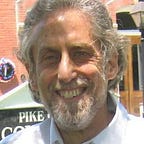Nutrition: Conflict of Interest as a Career
(Unsavory Truth, Marion Nestle, Oct 2018)
If you have followed Marion Nestle’s books as I have, you will note not so much a progression, as a regression. They started with the nutritional value of foods in the body, worked their way back to manufacturing and chemicals, and now with Unsavory Truth, there is almost nothing about food at all — just money. It’s as American as — individual apple pie in a cardboard sleeve.
The issue is the discipline of nutrition. It is decades behind other sciences in recognizing that money corrupts. They’ve only just begun arguing about it, as they are absolutely inundated with cash, gifts and samples to help sell pretend food. Just like doctors with pharmaceuticals. Netsle opens with the real foundation of the issue: the slightest gift influences the recipient. Those pens and umbrellas and freezer bags and coffee mugs, all serve to make the recipient feel indebted. They make them remember the donor’s company when it is time to buy, recommend or prescribe. It works. Beautifully. Or they wouldn’t do it.
The recipients whine and complain they aren’t that gullible or stupid. But they are. Worse, medical practitioners claim they are actually entitled to the gifts because of all the hard work and expense they went thorough to get to where they are. So bring on the junkets, the conferences in resorts around the world and all expenses paid plus honoraria. They earned it all! There’s an entire chapter just on Coca-Cola’s masterful efforts. She also includes a delightful cartoon — a bingo card one of her colleagues created, with a box for every moronic excuse why researchers can and should accept corporate money.
And it has been going on for so long, it is an accepted part of the culture. “The link between drug industry gifts and prescription practices is so firmly established that it is considered beyond debate,” she says. They live a career of conflict of interest. And so does nutrition.
Possibly the most important new bit of information in the book is what Nestle calls nutrifluff. Any study that claims one single food or additive improves health, prevents disease or provides all the nutrition you need — is nutrifluff. Those news releases come out all the time. Reporters take them at face value. But the world, nutrition, and science don’t work that way. Taking one element out of context is a scientific absurdity. Similarly, there is no such thing as a “superfood”. Foods work in combination. They each contribute in their own way. Alone, they can’t do the job. And none is endowed with special powers.
Companies are forever funding studies to prove their product performs exactly that way. Industry and foundations account for 70% of food-related research. NutraSweet funded 74 studies, all of which found it safe. In 94 other studies, 90% (84) questioned its safety. Since studies without corporate backing are becoming an endangered species, all studies should be read with a cynical eye. But they should actually be read, Nestle says, because the truth is often easy to see, and it doesn’t appear in the news release or the news report.
There are exceptions to the corporate study plague. The honey industry paid for a study to show that honey is healthier than high fructose corn syrup. It isn’t. It turns out that honey has about the same levels of fructose, and therefore all the problems of fructose. That the study was published at all is a small miracle.
Some frauds are easy to spot. Fifth Quarter Fresh brand chocolate milk claimed it alleviates symptoms of concussion in high school football players. It had the study to “prove” it. And it got school districts to switch to its products on that basis.
Nutritionists want to know what are the real of effects of various additives. ”We would find out a lot sooner if trade association agendas were not involved,” Nestle says. All the studies to prove chocolate is a beneficial supplement to any diet, diverts scarce research resources from more worthwhile studies, she adds.
At bottom, the industry uses the playbook devised by Big Tobacco. It is, as everyone now knows, a combination of diversion, selective use of data, obfuscation, flooding the market with sponsored “research”, quoting out of context and out and out lies. Later, the industry learned to create “grassroots” groups, fake associations of consumers demanding the freedom to consume at will. Apparently, you can get four or five decades of obscene profits using those tactics, while customers become ill and die by the millions. Whatever works.
What all this leads to is somewhere Nestle won’t go. She recommends consumers call food producers and demand to know where the money goes, and that companies pool donations in blind trusts to be doled out to worthy studies. But she acknowledges this is a longstanding disaster, the result of the takeover of the government by huge corporations. It is capitalism that is the problem. Giving the FDA, the EPA and other agencies the ability to force disclosure, retract false claims, prevent false advertising and fund research without strings would go most of the way to solving Nestle’s issues.
Not happening. The best we can hope for is being informed. Unsavory Truth meets that requirement.
David Wineberg
